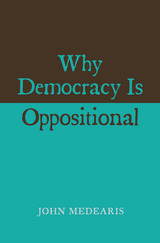
This book offers the first full-length treatment of Joseph Schumpeter's political thought. Schumpeter's theory of democracy as a competition among elites has influenced several generations of political scientists, but this book is the first to show that Schumpeter also conceived of democracy as a powerful transformative tendency leading toward the establishment of democratic socialism. Deploring this prospect, he theorized elite-dominated forms of society in which democratic change could be reined in.
The contrasts between the two perspectives are striking. The neglected transformative view, which this book expounds, stressed the importance of democratic beliefs and ideology, whereas the elite conception minimized their significance. The transformative perspective highlighted the radicalizing, dynamic effects of movements that attempt to realize democratic values and act upon democratic ideologies, while the better-known elite model depicted democracy in static terms and as institutionally stable.
Despite the sharp contrasts, both perspectives were part of Schumpeter's complex and deeply conservative response to political change in his lifetime. Precisely because he viewed democracy as a potent transformative social force, he labored strenuously to theorize a form of society in which elites could restrain the pace and nature of democratic change.

Is infrequent voting the most we can expect from a free citizenry? Would democracy be more robust if our political discourse were more deliberative? John Medearis’s trenchant and trend-bucking work of political philosophy argues that democracies face significant challenges that go beyond civic lethargy and unreasonable debate. Democracy is inherently a fragile state of affairs, he reminds us. Revisiting fundamental questions about the system in theory and practice, Why Democracy Is Oppositional helps us see why preserving democracy has always been—and will always be—a struggle.
As citizens of democracies seek political control over their destinies, they confront forces that threaten to dominate their lives. These forces may take the form of runaway financial markets, powerful special interests, expanding militaries, or dysfunctional legislatures. But citizens of democracies help create the very institutions that overwhelm them. Hostile threats do not generally come from the outside but are the product of citizens’ own collective activities. Medearis contends that democratic action perpetually arises to reclaim egalitarian control over social forces and institutions that have become alienated from large numbers of citizens. Democracy is therefore necessarily oppositional. Concerted, contentious political activities of all kinds are fundamental to it, while consensus and easy compromise are rarities.
Recovering insights from political theorists such as Karl Marx and John Dewey, Why Democracy Is Oppositional addresses contemporary issues ranging from the global financial crisis and economic inequality to drone warfare and mass incarceration.
READERS
Browse our collection.
PUBLISHERS
See BiblioVault's publisher services.
STUDENT SERVICES
Files for college accessibility offices.
UChicago Accessibility Resources
home | accessibility | search | about | contact us
BiblioVault ® 2001 - 2024
The University of Chicago Press









